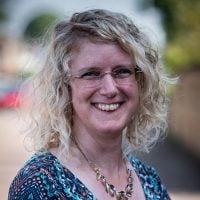Integration Involves All of Us

Standing at a bus stop recently, the lights in the studio flats in the block opposite were on. As a result, I could see inside a number of the tiny apartments. In each there was a lone individual and every single one was sat alone, hunched over a screen – albeit a mixture of laptops, tablets and phones. With the walls between them, it seemed to sum up the isolation of modern society, where everyone was so physically close and yet so distant, with only the distorted perspective of the digital screen as a source of connection.
We all need connection. Human beings are wired for it and yet Western society is currently experiencing overwhelming levels of loneliness and isolation.
In connection, we find purpose. Helping others is one of the foundations of well-being – when we help others, the benefits are mutual. Take Vera and Soheila for example, who met when Vera was volunteering in a Creative English class. Soheila had been afraid to leave the house as she did not speak English, but as the two women got to know one another it transpired that they were neighbours. Now, they see one another regularly – Vera pops in with food she’s cooked and invites the family round to play. Vera has helped Soheila by supporting her in meetings at the school regarding her older children and Soheila has described her as being like her mum. For Vera, she said how contact with this young family has given her a fresh lease of life. The friendship is of mutual benefit.
Connections across ages matter too. As experimental schemes where students live with the elderly, or play groups run in old people’s homes show, we all benefit from seeing life through the eyes of others. Glenda, for example, was invited multiple times to participate in a coffee morning for older residents. She was lonely and isolated, but consistently declined. When invited to help with a community workshop for local families, Glenda enthusiastically joined in due to her friendship with the neighbour who asked her. However, this workshop became something which she continued to help with, as she found that she actually really enjoyed it. She explained, “This is much better than being with a bunch of old folks. I think I catch some of the children’s energy. It’s lovely hearing them chatting away and when they ask you for things. I miss being with kids. My grandkids live so far away.”
When our friendships include people from a diverse range of backgrounds, it often puts our own problems into perspective and gives a much greater richness of experience, culture, creative expression and problem solving than we’d ever expect. One of our Creative English volunteers explained: “People helped me. It made such a difference when I moved here, now I want to help other people too.” A culture of care can replicate itself. Other learners explained, “We appreciated it so much when people brought us meals when we had a baby. We wanted to do it for our neighbour too… After the volunteers helped us with our English we could use it to do the shopping for Abimbola when she was sick.” Community is built through a thousand seemingly small actions of compassion and care.
Integration isn’t simply an issue for new arrivals, it’s an issue for us all.



